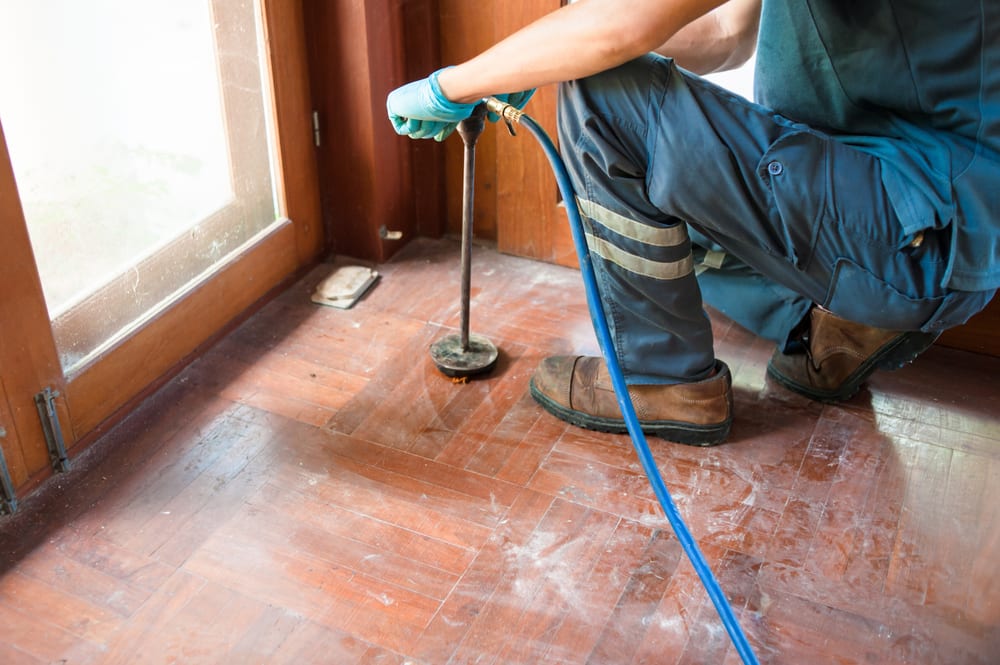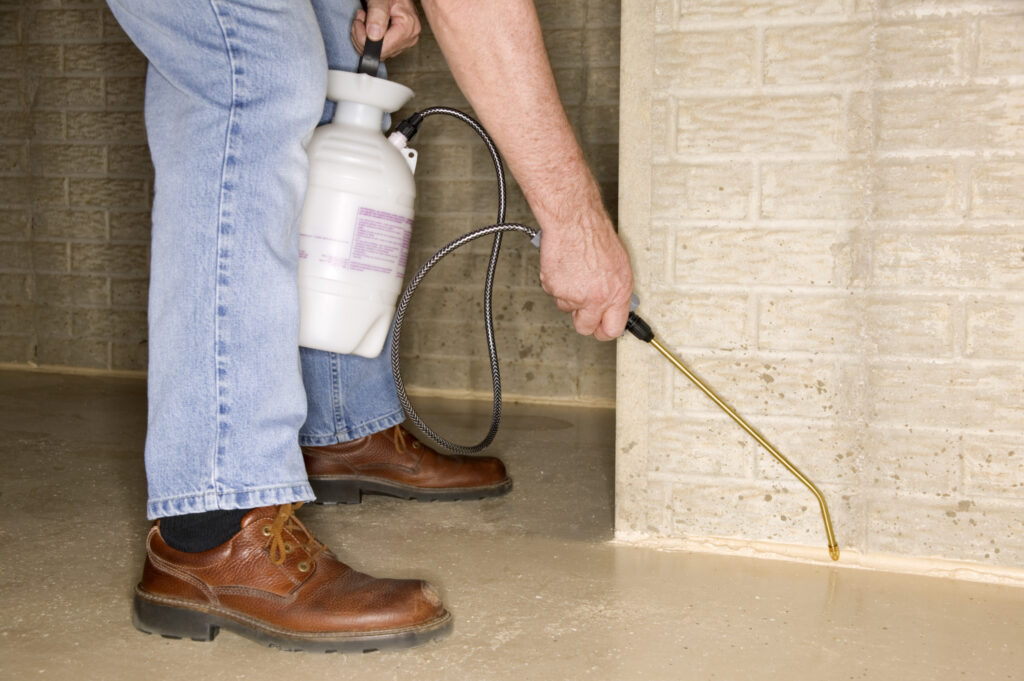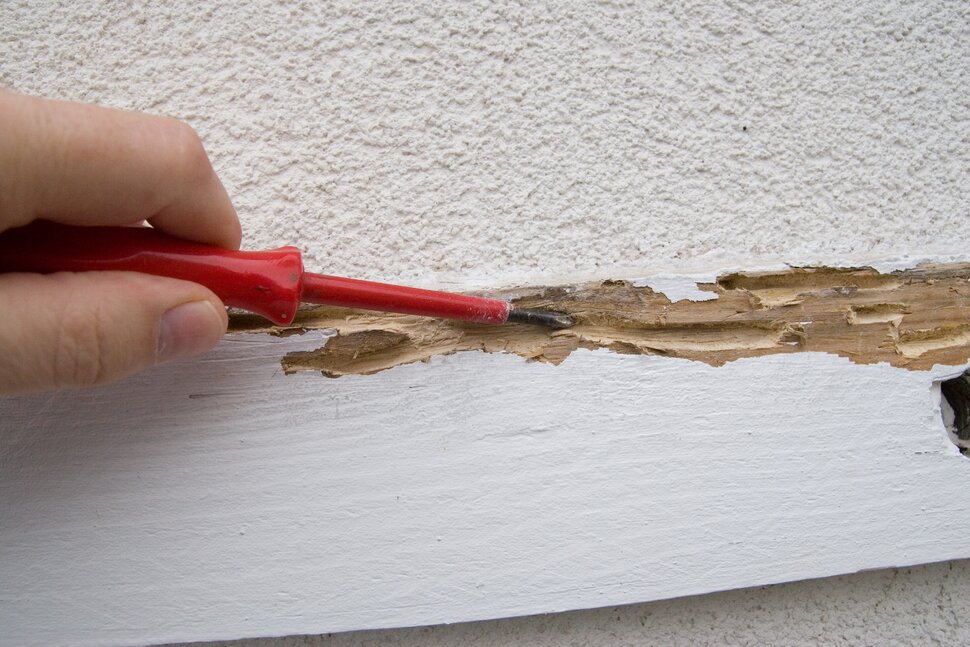Yes, Termite inspectors enter homes to look for termite problems, checking both inside and outside for signs of termite activity and damage.
Furthermore, there are the causes that make the termite inspectors come inside of your home.
- To inspect for signs of termite activity in hidden interior areas.
- To check for structural damage caused by termites inside the home.
- To investigate areas where termites may have gained access from the outside.
- To identify conditions conducive to termite infestations, such as moisture.
- Tap on wooden surfaces and listen for hollow sounds indicating termite damage.
- To search for discarded termite wings, a sign of recent swarming activity.
- To comprehensively assess the entire property, both inside and out.
What is a Termite Inspection?

A. Definition and Importance of Termite Inspections
Termite inspections are a crucial part of home maintenance. They involve thoroughly examining your property to identify any signs of termite infestation.
These tiny insects can cause structural damage that often goes unnoticed until it’s too late. That’s why termite inspections are essential for the protection of your home.
B. Overview of the Inspection Process
Termite inspectors are trained professionals who specialize in identifying termite infestations. The termite inspection process typically includes the following steps:
Exterior Inspection: Termite inspectors begin their inspection from outside, searching for termite signs around your home’s foundation, in wood, and in the soil.
Interior Inspection: Yes, termite inspectors do come inside your house. They check areas where termites are most likely to be found, such as crawl spaces, basements, attics, and other dark, damp places.
They inspect wooden structures, like beams, floors, and walls.
Use of Specialized Tools: Inspectors might use special tools such as moisture meters and thermal cameras to find hidden termite problems.
Report and Recommendations: The termite inspector will provide you with a detailed report of their findings after the inspection. If termites are detected, they will recommend treatment options to eliminate the infestation.
C. Signs of Termite Infestation
To understand why termite inspectors need to come inside, it’s essential to know the signs of termite infestation:
Mud Tubes: Termites often build mud tubes along walls, foundations, and other surfaces to protect themselves from the elements.
Wood Damage: Look for damaged or hollow-sounding wood, as termites eat through the cellulose in wood, weakening it.
Discarded Wings: After swarming, termites lose their wings. Discovering discarded wings on your property may indicate an ongoing termite infestation.
Frass: Termite droppings, known as frass, resemble tiny wood pellets and can be found near termite nesting sites.
Clicking Sounds: Sometimes, you might hear clicking noises in the walls, which could be soldier termites making sounds with their jaws. These sounds can be a sign of termite activity.
Conclusion
In summary, termite inspectors do come inside your house as part of the inspection process. This is crucial to identify hidden termite activity and protect your home from potential damage.
Don’t wait until termites have taken over; schedule a termite inspection today to keep your home safe and termite-free.
Do Termite Inspectors Come Inside?
If you’re concerned about termites in your home, you might be wondering whether termite inspectors actually come inside.
In this section, I’ll delve into the importance of thorough inspections, explain the areas inspectors typically check inside homes and highlight their common tools and techniques.
A. Importance of Thorough Inspections
Termite infestations can be sneaky and destructive, making thorough inspections crucial. While termites often start their invasion outside, they can quickly make their way indoors.
Getting inside your home is a piece of cake for these tiny but relentless pests. Therefore, termite inspectors need to come inside during their assessments.
B. the Areas Inspectors Typically Check Inside Homes
Termite inspectors leave no stone unturned when they step inside your home. Here are the areas they usually check:
Crawl Spaces: Inspectors venture into crawl spaces beneath your home, examining wooden supports and other susceptible areas. Termites adore these damp, dark spaces.
Basements: Termites can also find their way into your basement. Inspectors inspect wooden beams, walls, and any stored wood items.
Attics: Attics might not seem like termite hotspots, but inspectors know that termites can infest roof structures and attic spaces, particularly if there’s moisture.
Interior Walls: While termite inspectors can’t see through walls, they can tap or listen for hollow sounds. Hollow-sounding walls can indicate termite damage.
Wooden Floors: Inspectors closely examine wooden floors, looking for any signs of termite activity, such as weakened or damaged wood.
C. Common Required Tools and Techniques for Termite Inspection
To perform their inspections effectively, termite inspectors rely on various tools and techniques:
Flashlights: Inspectors use powerful flashlights to illuminate dark areas, making it easier to spot termite activity.
Moisture Meters: Termites thrive in moist environments, so inspectors use moisture meters to detect high humidity levels that could attract termites.
Termite Probes: Termite inspectors use special probes to check for termite tunnels or damage in wooden structures.
Thermal Imaging Cameras: These cameras can reveal temperature variations that may indicate termite activity or hidden infestations.
Experience and Expertise: The most valuable tool in a termite inspector’s arsenal is their experience and knowledge. They know where to look and what to look for based on their training and expertise.
In conclusion, termite inspectors will indeed come inside your home to conduct thorough inspections. Identifying and addressing termite infestations before they cause extensive damage is essential.
External Property Inspection
Now, let’s explore the external property inspection conducted by termite inspectors. This essential part of the inspection process helps ensure a comprehensive assessment of your property’s vulnerability to termite infestations.
A. Overview of the Areas Inspected Outside the Property
Termite inspectors don’t limit their examination to the inside of your home; they also pay close attention to the external areas. Here are the key areas they inspect:
Foundation: Inspectors thoroughly examine your home’s foundation, as it’s a common termite entry point. Any cracks or gaps are carefully scrutinized.
Exterior Walls: Inspectors also look at your house’s outer walls, searching for signs of termites like mud tubes or small holes.
Porches and Decks: Wooden structures like porches and decks are attractive to termites. Inspectors inspect these areas for any indications of termite infestations.
Fences: If your property has wooden fences, they, too, can be vulnerable to termites. Inspectors examine fence posts and boards for signs of termite damage.
Trees and Shrubs: Termites can use trees and shrubs as bridges to access your home. Inspectors assess the health of these plants and look for signs of termite activity in their roots or trunks.
B. Importance of Inspecting Exterior Elements and Structures
Inspecting the exterior of your property is vital for several reasons:
Prevention: Identifying termite activity in outdoor areas can help prevent them from moving inside your home. Early detection is key to stopping an infestation in its tracks.
Assessing Risk: Inspectors assess the risk level of your property. If there are conducive conditions for termites outside, such as excess moisture or direct wood-to-soil contact, it increases the likelihood of an infestation.
Tailored Recommendations: Based on their findings, inspectors can provide recommendations to address your property’s exterior vulnerabilities. This might include moisture control measures, wood treatment, or creating barriers to deter termites.
Comprehensive Protection: To safeguard your home completely, remember to think about both the inside and outside. An inspection that covers all aspects ensures thorough protection against termites.
In conclusion, termite inspectors are crucial in safeguarding your home from these destructive pests. The external property inspection is a fundamental part of their process, allowing them to assess vulnerabilities and take preventative measures.
What If Termites Are Found?
If termite infestation is discovered during the inspection, it’s essential to understand what steps to take next.
In this section, I’ll outline what happens if termites are found, the possible treatment options to eliminate these pesky invaders, and emphasize the importance of regular termite inspections for prevention.
A. What Happens if Termite Infestation Is Discovered During the Inspection
Discovering termites during an inspection can be concerning, but it’s better to identify the issue early. If termites are found:
Detailed Report
The termite inspector will provide a report of the termite infestation and their types in the affected areas.
Recommendations: Based on their findings, the inspector will recommend appropriate treatment options to eliminate the termites. These recommendations may vary depending on the severity of the infestation.
Discussion: You will have a discussion with the inspector to understand the recommended course of action, the associated costs, and the timeline for treatment.
B. Possible Treatment Options to Eliminate Termites
Termite treatment options aim to eradicate the infestation and prevent future damage. Common treatment methods include:
Chemical Treatments: Termite professionals may use liquid termiticides or baits to eliminate termites. Liquid termiticides form a protective barrier around your home’s foundation, while strategically placed baits lure and poison termites.
Fumigation: In severe infestations, tenting and fumigation may be necessary. This involves sealing your home and introducing a gas that eliminates termites within.
Wood Treatment: If termites have damaged wooden structures, those areas may need treatment or replacement.
Preventative Measures: In addition to eliminating existing termites, termite professionals often recommend preventative measures to protect your home from future infestations. These measures may include moisture control, sealing cracks and crevices, and regular inspections.
C. Importance of Regular Termite Inspections for Prevention
The discovery of termites underscores the importance of regular termite inspections for prevention. Here’s why they are vital:
Early Detection: Regular inspections allow for the early detection of termite activity, reducing the potential for extensive damage.
Peace of Mind: Knowing that your home is regularly inspected and protected against termites provides peace of mind for homeowners.
Cost Savings: Preventing termite infestations through regular inspections and preventative measures is far more cost-effective than dealing with extensive repairs.
Property Value: Regular inspections and a termite-free home maintain or increase the value of your property.
Choosing a Professional Termite Inspector

Selecting the right termite inspector is crucial to effectively safeguard your home from these silent invaders.
In this section, I’ll outline the key factors to consider when choosing a termite inspector and provide you with essential questions to ask during the hiring process.
A. Factors to Consider When Selecting a Termite Inspector
Credentials: Ensure that the termite inspector is licensed and certified. They should have the necessary qualifications and training to perform inspections and treatments.
Experience: Experience matters. Look for an inspector with a proven track record in identifying and treating termite infestations.
References:
Ask for references from past clients to check the inspector’s reputation and the quality of their work.
Insurance: Verify that the inspector carries liability insurance. This protects you in case of any accidental damage during the inspection or treatment.
Thoroughness: Ask about their inspection process. A good inspector will thoroughly examine both the interior and exterior of your home and the surrounding property.
B. Questions to Ask During the Hiring Process
What’s Your Certification and Licensing Status? Make sure the inspector is certified and licensed by the right authorities for termite inspections and treatments.
How Long Have You Been in the Termite Inspection Business? Experience matters, so inquire about their years in the industry and their track record.
Can You Provide References? Request references from previous clients to get feedback on their services.
Do You Carry Liability Insurance? Confirm that the inspector has liability insurance to cover any potential damage during the inspection or treatment.
What Does Your Inspection Process Include? Ask for a detailed description of their inspection process, including the areas they inspect and the tools they use.
What Treatment Options Do You Offer? In case termites are found, inquire about the treatment options they provide. Are they experienced in various treatment methods?
What Is the Cost of Your Services? Understand the pricing structure and whether it includes follow-up inspections or treatments.
Do You Offer Any Guarantees? Some inspectors offer guarantees on their work. Ask about any warranties or guarantees they provide for their services.
Are You Familiar With Local Termite Species and Conditions? Local knowledge is valuable. Ensure the inspector is familiar with the types of termites common in your area and local environmental conditions.
How Often Should I Schedule Inspections? Seek their recommendation on the frequency of termite inspections, as preventative measures vary by region and property.
Finally, choosing the right termite inspector is important in protecting your home from these destructive pests.
FAQs
Are termite inspections necessary if I haven’t seen any termites?
Yes, regular termite inspections are still essential, even if you have not seen any termites. Termites can often go unnoticed until significant damage has occurred.
What do termite inspectors look for during an inspection?
Inspectors search for termite signs like damaged wood, mud tubes, discarded wings, and swarming termites. They also assess moisture levels and potential entry points.
Can I perform a termite inspection myself?
Yes, you can perform a basic termite inspection yourself, but hiring a professional termite inspector is advisable for a comprehensive assessment.
How long does a termite inspection typically take?
A typical termite inspection takes approximately 30 minutes to 2 hours, depending on the structure’s size and complexity.
What happens if termites are found during an inspection?
If termites are discovered, the inspector will provide recommendations for treatment options. Treatment varies based on the infestation’s seriousness and can involve termite baits, liquid treatments, or fumigation.
Do I need to vacate my home during termite treatment?
In most cases, you do not need to vacate your home during termite treatment.
However, whether you need to vacate your home during termite treatment depends on the type of treatment that pest control professionals uses.
Is a termite inspection included in a standard home inspection?
No, a termite inspection is usually not included in a standard home inspection.
Conclusion
Termite inspectors typically come inside a property as part of their inspection process. They must thoroughly assess all areas of a building, as termites can cause significant damage, particularly in hidden or hard-to-reach areas.
By inspecting the interior of a property, including crawl spaces, basements, and attics, termite inspectors can identify signs of termite activity or damage, such as mud tubes, wood damage, or shed wings.
This thorough examination ensures that any termite infestations or potential risks are accurately assessed, and appropriate recommendations can be made.
It is essential to allow termite inspectors access to all necessary areas to ensure a comprehensive evaluation and provide the most accurate information for further action or treatment.

